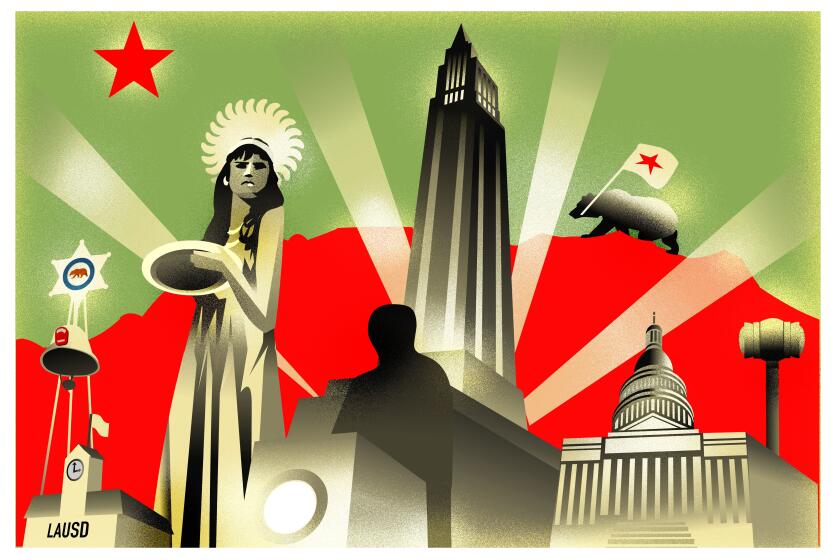Did you vote early in California’s Democratic presidential primary? Sorry to hear that
- Share via
Well, that was quick.
Within days of former Vice President Joe Biden’s dominant victory in South Carolina, the race for the Democratic nomination for president clarified dramatically. Biden’s two leading opponents in the party’s moderate wing — Sen. Amy Klobuchar (D-Minn.) and former South Bend, Ind., Mayor Pete Buttigieg — dropped out and reportedly planned to endorse Biden at a rally Monday night. That leaves only five major candidates still running, including the current leader, Sen. Bernie Sanders (I-Vt.).
So much for moving California’s primary up a few months to make it more relevant. The contests in four of the country’s smaller states — the largest being South Carolina, a state that Republicans usually win in November — have winnowed the field from roughly 30 serious (or in some cases, semi-serious) contenders to just a handful. Californians who’d hoped to advance an alternative to the old familiar faces of Sanders and Biden are left with only three options. On the left, there’s boomer Sen. Elizabeth Warren (D-Mass.); in the middle there’s boomer Michael R. Bloomberg (D-Fort Knox); and flitting between the left and the right there’s the only remaining millennial, Rep. Tulsi Gabbard (D-Hawaii).
What’s worse for California voters is that many of the withdrawals came after the state’s ballots were mailed out. And with so many Californians using mail-in ballots — more than two-thirds of the votes in the 2018 primaries were cast that way — it’s possible that a sizeable chunk of votes were cast before the shakeout in the field.
Los Angeles Times editorial board endorsements for the U.S. House, California ballot measures and more.
If every Democrat had waited to vote until Tuesday, then Buttigieg and Klobuchar’s endorsements of Biden could have brought the former vice president within hailing distance of Sanders. But they didn’t, so those endorsements may offer Biden little help tapping the Golden State’s bounty of delegates.
The lesson here is that, in its eagerness to increase turnout, California invited millions of people to vote too early. Maybe it’s super convenient to be able to mail in a ballot three weeks ahead of election day. But when you’re in the early stages of a primary, it’s also a risky proposition.
You can’t blame Californians who voted early for someone like Buttigieg or Andrew Yang for trying to hand the party’s baton to a new generation of leaders. But once again, voters in a handful of other states controlled the baton. So remind me, why did we move the primary up again?
It’s worth remembering that California’s last presidential primary was held in June 2016, long after the aspirational candidacies of former Maryland Gov. Martin O’Malley and former Sen. Jim Webb (D-Va.) had been extinguished. But the nomination was still in play, as Sanders and Hillary Clinton were still fighting for a majority of the pledged delegates. Clinton’s win in California helped her seal the deal.
This go-around, California is caught in an electoral cease-fire zone. Its primary is happening after most of the candidates have been weeded out. But the state printed and mailed ballots before that clarity arrived, which will likely muddy the primary results.
One caveat: The state will be one of the first to render judgment on Bloomberg’s candidacy. And so far, things aren’t looking so good for #MiniMike. Perhaps California voters will be able to help winnow the field after all.
More to Read
A cure for the common opinion
Get thought-provoking perspectives with our weekly newsletter.
You may occasionally receive promotional content from the Los Angeles Times.











